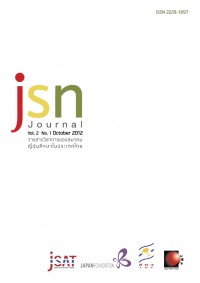ความคิดของผู้นำและกิจกรรมของหญิงไทยในสมัยสงครามโลกครั้งที่ 2 ภายใต้เงากองทัพญี่ปุ่น
Main Article Content
Abstract
งานวิจัยนี้เป็นการศึกษาความคิดของผู้นำ กล่าวคือ ความ คิดของรัฐบาลจอมพล ป. พิบูลสงครามที่มีต่อผู้หญิงไทย ในช่วง สงครามโลกครั้งที่ 2 (พ.ศ. 2481 – 2487) ซึ่งมีกองทัพญี่ปุ่นเป็น ตัวแปรสำคัญตัวหนึ่งในการกำหนดกิจกรรมและนโยบายของรัฐ
ภายใต้แนวคิดชาตินิยมของรัฐ ปรากฏว่ากิจกรรมของผู้หญิง เฟื่องฟู มีกิจกรรมที่เกิดขึ้นเป็นครั้งแรกหลายอย่าง เช่น เกิดกองทหาร หญิงขึ้นในกองทัพสมัยใหม่ของไทยเป็นครั้งแรก มีการจัดงานวันแม่ ขึ้นเป็นครั้งแรก มีวันที่ระลึกข้าราชการสตรีเป็นครั้งแรก เป็นต้น งาน วิจัยนี้จึงมุ่งศึกษาความเชื่อมโยงระหว่างความคิดของรัฐบาลที่อยู่ เบื้องหลังการกำหนดกิจกรรมและนโยบายสำหรับผู้หญิงไทย กับบริบทของสังคมการเมืองไทยในขณะนั้นซึ่งมีกองทัพญี่ปุ่นอยู่ ภายในพื้นที่ประเทศ โดยมีคำถามว่าการส่งเสริมกิจกรรมผู้หญิง ของรัฐไทยในช่วงสงครามโลกครั้งที่ 2 นั้นมีความสัมพันธ์กับการ เข้ามาของกองทัพญี่ปุ่นหรือไม่ อย่างไร
ผลการศึกษาโดยใช้เอกสารจากฝ่ายไทย ทั้งเอกสารราชการ และหนังสือพิมพ์ นิตยสาร วารสารต่างๆ พบว่า กิจกรรมของผู้หญิง ที่รัฐจัดขึ้นในช่วงนั้น มีเป้าหมายเพื่อเน้นย้ำบทบาทเมียและแม่ของ ผู้หญิง โดยมีคุณสมบัติสำคัญที่รัฐต้องการคือ “การเป็นเมียของ ชายไทย เพื่อเป็นแม่ที่ให้กำเนิดลูกที่มีเชื้อสายไทยบริสุทธิ์” และ ในขณะเดียวกันรัฐก็ได้สร้างภาพผู้หญิงไม่ดี คือ ผู้หญิงที่เป็นเมีย ชาวต่างชาติ ผู้หญิงเหล่านี้จะถูกมองว่าเป็นผู้ที่ไม่รักชาติ เป็นเพียง ผู้หญิงที่เห็นแก่เงิน ซึ่งเกิดในบริบทที่รัฐบาลจอมพล ป. พิบูลสงครามมีความวิตกกังวลต่อการแผ่ขยาย อิทธิพลของญีปุ่น ที่อาจจะกระทบ ต่อความเป็นเอกราช โดยเฉพาะ อย่างยิ่งเอกราชทางวัฒนธรรม และความบริสุทธิ์ของเชื้อชาติ ไทย เนื่องจากการเข้ามาของ กองทัพญี่ปุ่นหมายถึงการมีชาย ชาวต่างชาติเข้ามาอยู่เป็นจำนวนมาก
The Leadership’s Perception towards Thai Women during World War II under the Influence of the Japanese Military Regime
Piyawan Asawarachan
Faculty of Liberal Arts, Thammasat University
This study examines Field Marshal Plaek Phibulsongkram administration’s perception towards Thai women during World War II (1938-44), at which time the influence of the Japanese army was an important element to determining Thailand’s state policies.
Under the nationalistic regime, the government spawned a number of activities involving women, such as the establishment of a military company comprising women soldiers in its entirety, the recognition of the Mother’s Day and Female Civil Servants Memorial Day. This study investigates the relationship between the Japanese military control over Thailand during World War II and the administration’s underlying reasons behind the promotion of women activities as well as the formation of policies towards these women under such circumstance. Investigating official documents, Thai local newspapers and magazines, this study found that the administration was deeply concerned about the increased Japanese influence, thereby an increased number of foreign men in the country, that could have threatened Thailand’s cultural independence and the purity of Thai race. Women activities during this period, therefore, were designed to reinforce the role of women as a wife and a mother. The typical role model of a Thai woman that the state desired was “a wife to a Thai man who gives birth to a baby with pure Thai blood”. The state also assigned the image of bad women to those married to foreigners, and labeled them as unpatriotic and mercenary.
Article Details
ข้อความและข้อคิดเห็นต่างๆ ในบทความเป็นของผู้เขียนบทความนั้นๆ ไม่ใช่ความเห็นของกองบรรณาธิการหรือของวารสาร jsn Journal


